The Vega should have been a hit. But it wasn’t, yet Chevy sold more than two million copies in seven years. A lot of planning went into Chevrolet’s first subcompact, but they didn’t get the execution right as the car suffered from bad engines and poor quality control. A lot of that had been worked out by the time the seller’s 1975 GT was built. Without a powertrain and some other items, it may be just a parts car now as a restoration will be costly. But the price is right: the bidding here on eBay is only up to $255 for a vehicle that’s spent a lot of time in a field in Wichita, Kansas.
Named after the brightest star in the constellation Lyra, the Vega debuted in the Fall of 1970 and “ran” until 1977. Available in multiple body styles, the fuel-efficient cars were propelled by an inline-4 engine using a lightweight, aluminum alloy cylinder block. Though named Motor Trend’s Car of the Year in 1971, the automobile soon became widely known for many problems related to engineering, reliability, safety, a propensity to rust, and engine durability. Despite a rash of recalls and design upgrades, the Vega’s problems tarnished both its own as well as General Motors’ reputation.
Sales peaked in 1974 at 460,000 copies due to the huge demand for small cars that was created by the 1973 OPEC oil embargo. Things went downhill after that. Production dropped to 207,700 units in 1975 of which 113,000 were hatchbacks like the seller’s GT (a performance option; the engine was the same as in the others except for the Cosworth Vega, which is another story).
From the looks of things, this ’75 Vega GT has been keeping company with a vintage Lincoln out in a field in “Tornado Alley”. Photos provided by the seller show it there and on the back of a trailer, so we assume it has since moved to higher ground. We’re told the car is “just a shell” as the engine, transmission, driveshaft, and radiator have all taken flight. The body is said to be in great shape with minimal rust, but we can’t see what’s going on below. From sitting on the ground, the floors and trunk are bound to have been bitten by the tinworm.
The seller postulates this might serve as a good drag car as some hot rodders like to drop in V8 engines and go racing. But whatever you decided to do with it, the car is not complete. The windshield is missing as well as the door panels. The rear end is supposedly bad, but the seller has a spare that he/she is throwing in on the deal. If you’ve been wanting a Vega project and like putting pieces together again, maybe this puzzle is for you.
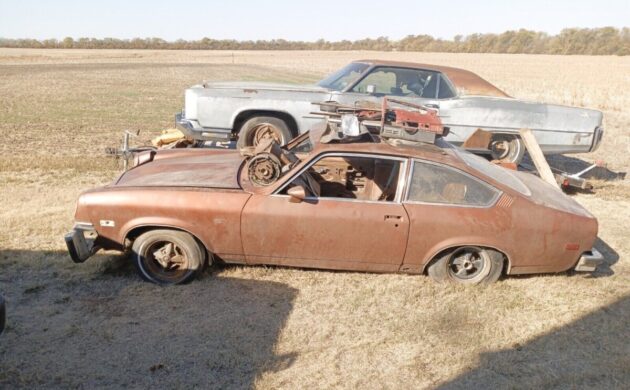
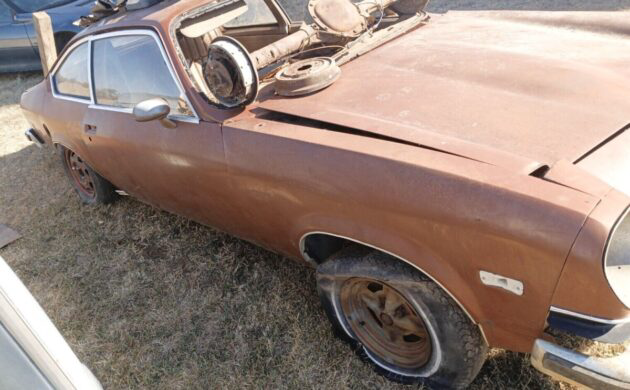
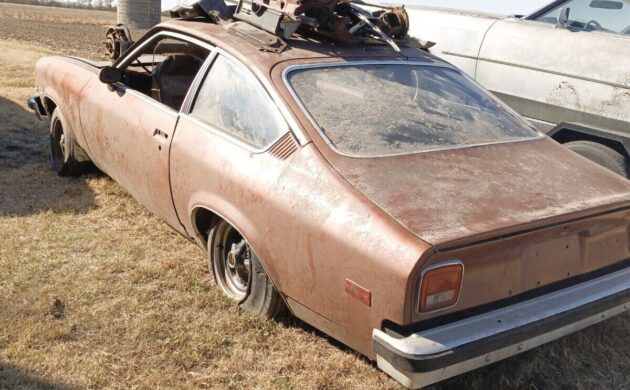
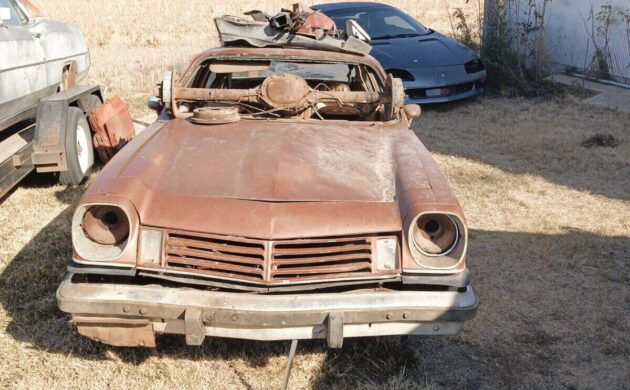
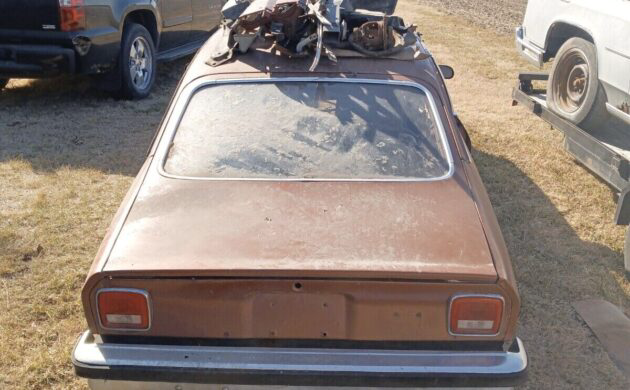



If in my area, I’d buy it as even bodies are hard to find. It does have the GT features of wheels, white front turn signals. Headlight buckets should be painted black over the chrome inside, but easy fix. Dash would be the hard part along with door panels if not correct.
Still, a good candidate for a 4.3L V6.
Well there’s a first, a car with the diff and axle poking out of windscreen.
That’s why we love Barnfinds Russ.
This one would be cool with a 1990s V6 and 4 speed manual.
Agreed. I’d put a Buick V6 in it and call it a day. Back in my day, there were some brave souls who ran 350s
in them for street use. Even in stock
form, a 350 would make a Vega do
strange things when you hit the go
pedal a bit too hard. Oh Santa, here’s
my new project! I’ve been a good little boy this year!
1st, there’s a contradiction for ya’, the car wasn’t a hit, yet sold 2 million copies. Not sure what is considered a “hit”, numbers wise, but it sure qualifies as a hit to me, and it was. As said many times, the Vega was a good car, just had too big a shoes to fill. It was a mini-Camaro, got good gas mileage, looked sporty, good heaters, I knew folks that had great luck with Vegas. Strict maintenance was the key, and with most buyers coming from Electra 225s, buying them in desperation over gas prices, they simply drove them too hard, and never changed the oil. That was okay for the big Buick, but not a 4 cylinder. The Vega, like the Pinto, were uncharted territory for Americans, and the Vega was a good start. Vegas biggest nemesis was the Toyota, that mysteriously appeared around the same time, with superior mechanicals, but were poor cars compared to the Vega.
This? Looks like someone cleaning out the yard,,,and maybe some parts for that one person, “Mr. Vega”, I assume, and I’m sure there’s one,,would want this.
I would indeed like to have this. A Vega in this condition in my area is worth $3k as a shell.
It would only better if it was a Kammback wagon.
Hello not sure where you live 😕 but there’s a boneyard in Umatilla florida that has lots of old Vegas in various stages of decomposition. So if you’re looking for parts 🤔 give Umatilla auto salvage a call.
Yes, I would say the definition of a ‘miss’ was the poorly remembered Plymouth Cricket. I have one of perhaps ten roadworthy examples left on the American roads!
Let Mother Nature finish this restoration project.
My Vega had more rust in it’s first year than this thing has in almost 50. By 1976, the buddy I sold my 74 to had duct tape on the back corners of the quarter glass to keep the rain out.
Anyone remember the weird shipping method for these?
https://www.motortrend.com/features/chevrolet-vega-vert-a-pac/
It was this method if shipping that was responsible for their rusting problems. The cars were not dipped for rust protection. When stood on their nose, the rail cars used were not sealed for water from above which allowed for water to get into the cows and spaces around the glass behind all protection built in for every day driving. This water was trapped and allowed rust to form quickly on the back side of the unprotected surfaces, causing rust to appear around the windshields front and rear.
Once the experimental transport project ended, so did the rust problems stop appearing in the later models.
Vertapak was not used on any other model.
Pass on this one . Leave it where it is.
Its worth more than the asking price for anyone restoring an old Modified stock car and wants to run a Vega body. The 70s big 3 compacts are long gone on the East coast, so if you’re needing one you’re heading down south or out west. Someone I know paid nearly $1000 for two junk Pintos with no drivetrains just to use one for its body !
Bought a new 4-spd ’72 Kammback GT. GTs had 2 barrel carbs instead of one and I think rated at 110hp versus 90 for the single barrel carb. Owned it 21/2 years with zero issues. Only recall during that time was to add an overflow radiator bottle due to overheating concerns. Always thought those 2-door wagons looked sharp.
I wanted a Vega Kammback when they were first introduced, but my brother talked me into buying a Pinto wagon. I still don’t talk to him.
Considering where it’s pictured…..burying it…would seem to be the first choice.
If one didn’t have explosives ! lol
Is this Vega a low-rider, or was it parked in a swamp?
Another Motor Trend COTY. We learned years ago, to do the exact opposite of what these so called experts said. Vega’s were nice looking pieces of junk.
Glad the guy cleaned it off so you could see the whole body. I agree stock car body, but if its dry enough underbelly might be ok. Good luck, the outer body dont look bad. Might be a good deal if u need one, git yer trailer ready!!
Cheers
GPC
The Vega and Lordstown were besieged by labor problems and manufacturing defects for a fair bit of time.
It was unfortunate.
I will not judge here, but we studied the Lordstown management /labor issues during (I think) my junior or senior year in college, it had significant effects on production and quality; with attendant effects on revenues and labor relations.
I wonder where Howard comes up with his comments. But he is a member, I am not.
Anyone who worked at GM’s Massena Casting plant during the 1970’s is familiar with the engine problems that plagued the early Vegas. The engine block was pressure die cast Aluminum. The process requires rapid cooling of the injected molten aluminum alloy which is successfully done on thinner wall items like transmission housings. The Vega engine block casting, however, has some much thicker areas to be cooled requiring faster heat transfer or more cool down time. The result was poor cooling of thick areas causing porosity, cracking and weakness leading to water or oil leakage. Also, the erosive effect of the molten aluminum against the H21 tool steel die sprue increased downtime for die maintenance slowing production. GM engineers then switched to a high density, high thermal conductivity (W Ni Fe Mo) powdered metal for sprue and die inserts to increase sprue life and better cool the castings before removal from the dies (other automakers with aluminum blocks employed sand castings which were allowed to slowly cool usually avoiding the porosity problem).
FWIW, the block did not use wet cylinder liners as did some European makes having aluminum blocks. GM relied on a silica content aluminum alloy
for the block and cylinder walls. In service, the engine overheating issue caused cylinder distortion and excessive wear with resultant oil burning.
The Vega engine was a great idea but, required more development time which top management wouldn’t approve.
Cracking into coolant or oil passages wasn’t really an issue, but if the engine overheated, which was easy to do with the postage stamp nicknamed half size single core radiator, the head and block expanded at different rates, with the block frequently warping. The block could be surfaced to bring it back, but unless tge radiator was replaced with a full size and iron sleeves were installed, the problem would return.
I can’t speak for the design or manufacturing side, but I can speak about results and the improvements made to address the design flaws .
I had a 75 Vega GT Kammback, a 2-door wagon. Bought it new, great car, fun to drive… had it for 5 years. No problems.
Not worth $50.00.
The body shell is well worth over $500 to a guy building/restoring a vintage modified – even as scrap its worth more than $50.00 .
Like all cars after 1973(?) the 5 m.p.h. bumpers turned a nice looking design into a Fugly mess. The 71-73 Vegas with small bumpers looked much nicer.
Leave it in the field..I had a 73 gt..2.or 3 motors later..it just died after 40k miles..esp.in the summer..it would run hot like a 396.motor.looking for a ice block….I was in college in 75..I think my little brother ran it into a mailbox.somewhere..came home.in the summer..asked my dad wheres.the vega..he just laughed at me……they were nothing to write home about but it did beat.riding.around in a worn out 66 chevelle with no heater…gm stuff..greatness..
Keep the Vega. That Lincoln coupe is far rarer and much nicer to drive.